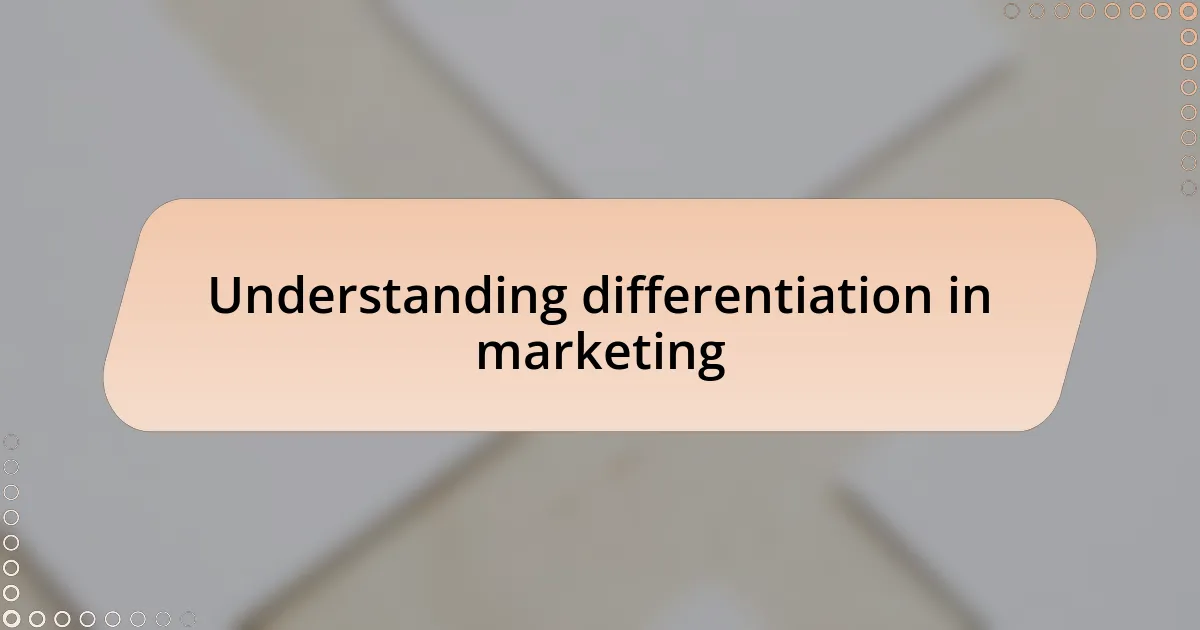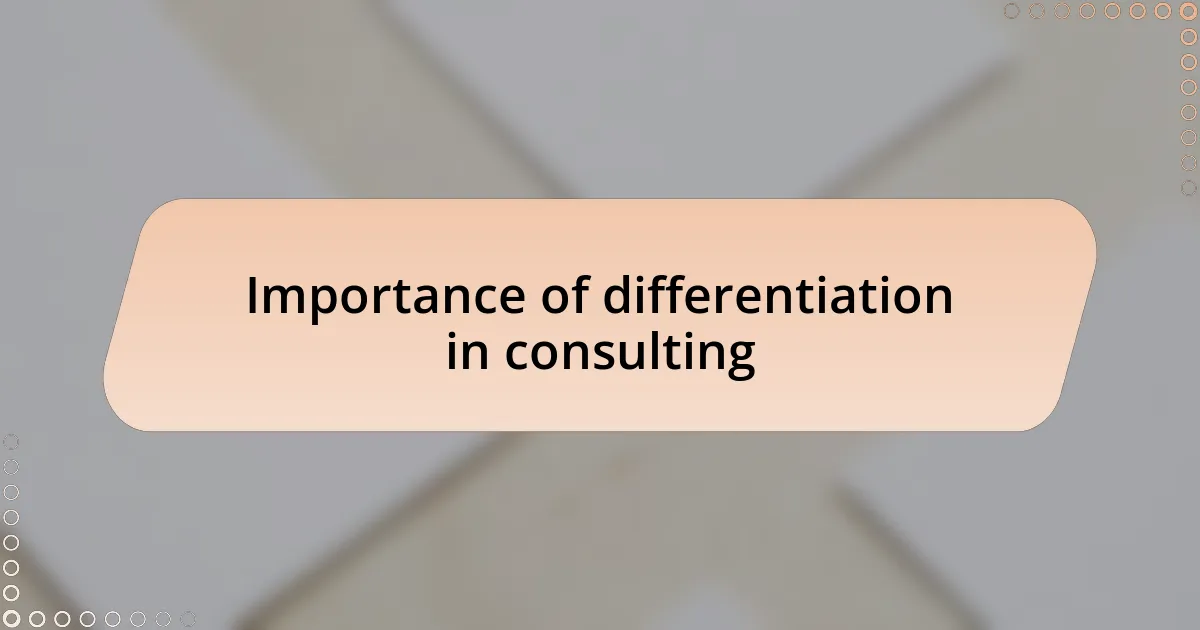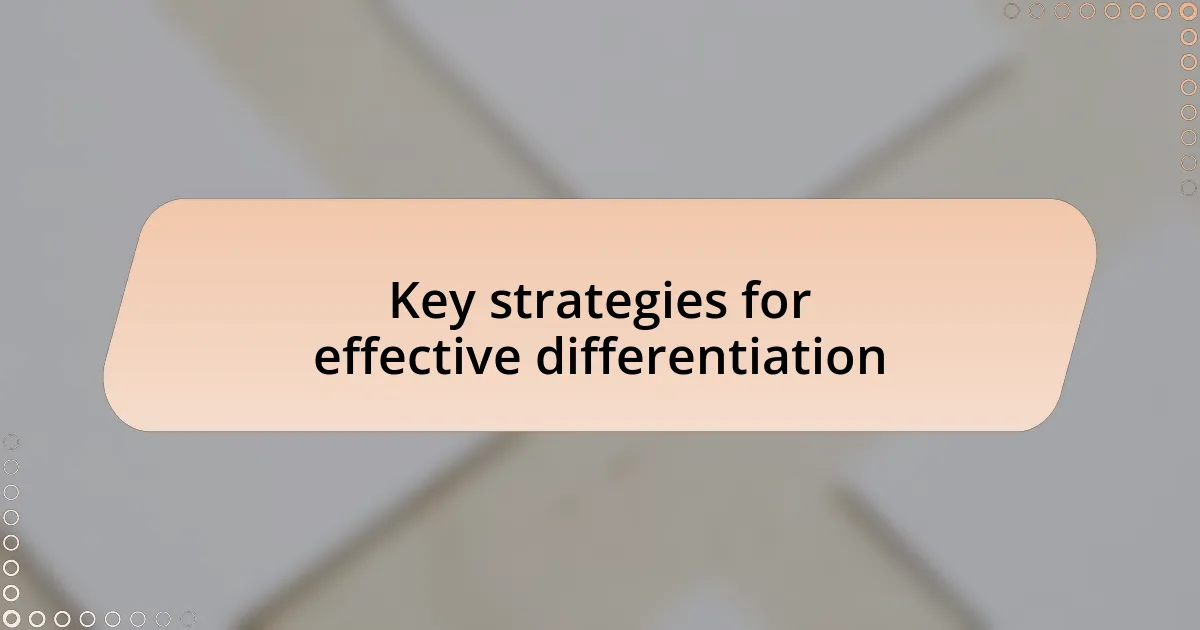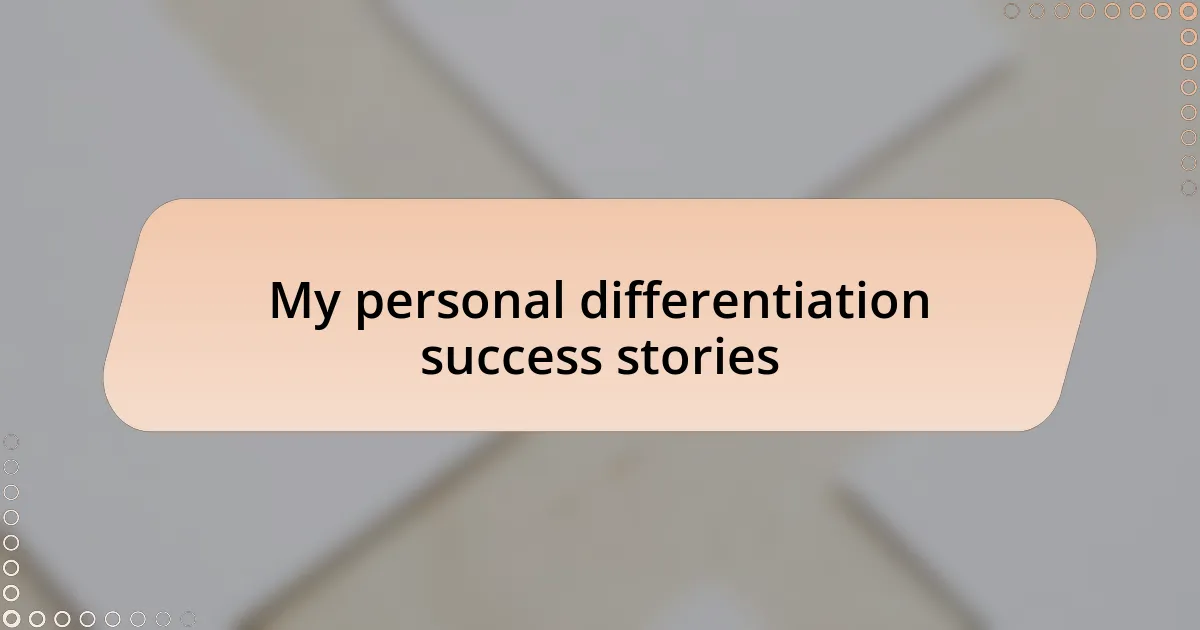Key takeaways:
- Differentiation in marketing involves creating an emotional connection with the audience by aligning services with core values.
- Consultants succeed by articulating their unique value proposition and providing exceptional client experiences that foster trust.
- Effective targeting requires understanding specific demographics and psychographics to tailor marketing strategies that resonate emotionally.
- Innovative competitor analysis can uncover gaps in communication or service delivery, allowing brands to position themselves uniquely in the market.
Author: Evelyn Harper
Bio: Evelyn Harper is an award-winning author known for her captivating novels that explore the complexities of human relationships and the beauty of everyday life. With a background in psychology and a passion for storytelling, she weaves intricate narratives that resonate with readers around the globe. Evelyn’s work has been featured in numerous literary magazines, and her debut novel was listed as a bestseller. When she’s not writing, she enjoys hiking in the mountains of her home state, Oregon, where she draws inspiration from nature and the world around her.
Understanding differentiation in marketing

Differentiation in marketing is about standing out in a crowded marketplace. When I first started my consulting career, I struggled with this concept. I often wondered, “What makes my services unique?” It was through exploring my personal strengths and the specific needs of my clients that I discovered the importance of showcasing my unique approach.
In my experience, differentiation isn’t just a strategy; it’s an emotional connection with your audience. I recall working with a small business that had a fantastic product but lacked a clear identity. By helping them identify their core values and aligning their marketing efforts with those values, we created a brand that resonated deeply with customers. Isn’t that what we all want—to forge meaningful connections?
I’ve also noticed that effective differentiation requires ongoing reflection. I regularly ask myself, “How can I evolve my offerings to meet changing market demands?” This mindset has allowed me to adapt and innovate continually. In today’s fast-paced world, staying relevant through differentiation isn’t just beneficial; it’s essential.
Importance of differentiation in consulting

Differentiation is vital in consulting because it defines how clients perceive value in your services. I remember a pivotal moment when a potential client told me they chose my consultancy over others because I took the time to understand their unique challenges—not just on the surface, but diving into the underlying issues. This experience highlighted to me that the clarity in what distinguishes my approach directly impacts client trust and engagement.
Consultants often face fierce competition, reminding me of a crowded race where every participant wears the same jersey. In such scenarios, my belief is that authentic storytelling can set one apart. When I shared my passion for helping entrepreneurs turn their dreams into reality, it wasn’t just my skills that appealed to clients but also my genuine commitment to their success. Isn’t it incredible how a personal touch can transform a service into a solution?
Moreover, embracing differentiation allows for more targeted marketing efforts. I once tailored my messaging to resonate with startups, using language and examples that spoke directly to their experiences and aspirations. The results were profound—my engagement rates soared as clients felt understood and seen. In this competitive landscape, isn’t it worthwhile to reflect on how we can better articulate our unique value?
Key strategies for effective differentiation

One of the most effective strategies I’ve found for differentiation is to develop a unique value proposition. For instance, I once worked with a client who struggled to articulate what set them apart in their niche market. Together, we pinpointed their specialized expertise and tailored messaging to communicate that clearly. By focusing on what makes them different, they not only attracted their ideal clients but also built a stronger brand identity.
In addition to a solid value proposition, I’ve discovered that exceptional client experiences can create lasting differentiation. I vividly recall a project where I went above and beyond to ensure open communication, offering weekly check-ins rather than waiting for scheduled updates. This approach fostered a deeper relationship, and clients appreciated that I genuinely cared about their progress. Have you ever experienced that wow factor in a service? It’s the kind of personal touch that transforms transactions into partnerships.
Finally, leveraging client testimonials can be a game changer. I remember encouraging a client to gather feedback from their customers, highlighting how my consulting helped them overcome challenges. When they showcased these stories on their website, it resonated with potential clients on a human level. Don’t underestimate the power of authentic voices—aren’t we all more likely to trust our peers over polished sales pitches?
Analyzing target market for differentiation

When analyzing the target market for differentiation, identifying specific demographics and psychographics is essential. I recall a project where we dived deep into the desires and pain points of our target audience. We discovered that while the client’s competitors focused solely on product features, our audience craved emotional connections and stories. This understanding allowed us to shift the marketing strategy to highlight personal narratives, which made a real difference in resonating with potential customers. Have you ever noticed how a well-told story can stick with you long after the details fade?
Moreover, segmentation within the target market can unveil niches that are often overlooked. In one case, I saw how breaking down the audience into smaller segments revealed a group with unique needs and preferences. By tailoring language and offers to align with their specific interests, my client not only stood out but also fostered loyal connections. It’s fascinating to think—what if you could speak directly to the heart of your audience’s needs? This kind of focused approach can truly elevate a brand’s message.
Lastly, market research tools can provide invaluable insights into consumer behavior and trends. I remember utilizing online surveys and social media analytics to gather real-time feedback about our target audience’s shifting priorities. This data allowed us to adjust our differentiation strategy on the fly, staying ahead of competitors who were relying on outdated assumptions. Have you leveraged the power of data to refine your messaging? Embracing these insights can transform the way you connect with your audience, creating a dynamic relationship that fosters growth.
Evaluating competitors for unique positioning

When it comes to evaluating competitors for unique positioning, I find that a comprehensive competitor analysis can reveal surprising insights. In one project, I mapped out a competitor landscape and discovered a common theme: many brands were stuck in a traditional messaging rut. They emphasized functionality while overlooking how emotions drive purchase decisions. This led me to rethink my client’s value proposition, allowing us to position their brand as not just a choice, but an experience that resonates on a deeper level. Have you ever thought about how a fresh perspective can dramatically shift your competitive edge?
Diving deeper into competitor offerings often uncovers gaps that are ripe for exploration. I recall a time when we identified a segment of competitors that were neglecting customer service, focusing solely on sales. By emphasizing exceptional service and post-purchase support, my client not only differentiated themselves but also attracted customers who had previously felt undervalued elsewhere. This experience taught me that it’s not always about having the most features; sometimes, it’s about delivering the best experience. Isn’t it interesting how redefining what success looks like can lead to powerful positioning?
Furthermore, analyzing customer feedback on competitors can present invaluable opportunities. I’ve spent hours sifting through online reviews to gauge what people appreciate and what frustrates them. In one instance, we discovered that consumers were dissatisfied with competitors’ response times. Capitalizing on that, my client improved their communication protocols and highlighted this in their marketing campaigns. This not only set them apart but also established trust before they even made a sale. Have you considered what your potential customers are saying about your competitors and how you can turn their complaints into your strengths?
My personal differentiation success stories

In my journey of differentiation, one standout success was when I helped a local bakery rebrand itself. They had great products but struggled to stand out in a crowded market. By highlighting their commitment to sourcing local ingredients and sharing the stories behind the farmers, we created a narrative that connected emotionally with customers. Suddenly, they weren’t just selling bread; they were part of a community story. Isn’t it fascinating how authenticity can transform a brand’s identity?
Another experience that shaped my approach involved a tech startup that was overwhelmed by larger competitors. Instead of trying to mimic their strategies, we focused on their unique culture and agile processes. By positioning them as the “personalized tech partner,” we appealed to clients who valued tailored solutions over cookie-cutter services. The feedback we received was incredible—customers expressed relief that someone truly understood their needs. Have you ever considered how your unique attributes can position you more effectively than trying to fit into an established mold?
Lastly, I remember working with a fitness studio that offered both group classes and one-on-one training. Many competitors were fixated solely on the high-energy group classes. We decided to emphasize a holistic wellness approach, including nutrition coaching and mental health workshops. This multifaceted offering resonated deeply with potential clients, allowing the studio to attract individuals seeking more than just a workout. It made me realize that people often look for solutions that cater to their overall well-being, rather than just a singular goal. Isn’t it powerful to think about how we can fulfill unaddressed needs in our markets?